Protoplast Isolation and Shoot Regeneration from Protoplast-Derived Callus of Petunia hybrida Cv. Mirage Rose
Abstract
1. Introduction
2. Materials and Methods
2.1. Plant Materials
2.2. Protoplast Isolation and Purification
2.3. Protoplast Yield and Viability Testing
2.4. Protoplast Culture
2.4.1. Effect of Plating Density and Osmoticum Condition on Viability of Protoplast-Derived Microcolonies
2.4.2. Effect of Plating Density on Cell Division Frequency and Callus Formation
2.4.3. Effect of Different Media and Dark/Light Conditions on Callus Formation
2.4.4. Effect of Plant Growth Regulators on Shoot Induction from Callus
2.5. Detection of Genetic Stability in Protoplast-Derived Shoots by RAPD
3. Statistical Analysis
4. Results
4.1. Effects of Mannitol and Cellulase Concentrations on Protoplast Isolation
4.2. Effect of Digestion Time on Protoplast Isolation
4.3. Protoplast Culture
4.3.1. Effect of Plating Density and Osmoticum Condition on Viability of Protoplast-Derived Microcolonies
4.3.2. Effect of Plating Density on Callus Formation
4.3.3. Effect of Plant Growth Regulators on Shoot Regeneration from Protoplast-Derived Callus
4.4. Analysis of Genetic Variation Using an RAPD Marker
5. Discussion
6. Conclusions
Supplementary Materials
Author Contributions
Funding
Conflicts of Interest
References
- Davey, M.R.; Cocking, E.C. Uptake of Rhizobium by isolated plant protoplasts. Nature 1972, 239, 455–456. [Google Scholar] [CrossRef]
- Ohyama, K.; Gamborg, O.; Miller, R.A. Uptake of exogenous DNA by plant protoplasts. Canad. J. Bot. 1972, 50, 2077. [Google Scholar] [CrossRef]
- Davey, M.; Anthony, P.; Power, J.; Lowe, K. Plant protoplasts: Status and biotechnological perspectives. Biotechnol. Adv. 2005, 23, 131–171. [Google Scholar] [CrossRef] [PubMed]
- Grosser, J.; Calovic, M.; Louzada, E. Protoplast fusion technology—Somatic hybridization and cybridization. In Plant Cell Culture: Essential Methods; Davey, M., Anthony, P., Eds.; John Wiley & Sons: New York, NY, USA, 2010; pp. 175–198. [Google Scholar]
- Subburaj, S.; Chung, S.J.; Lee, C.; Ryu, S.M.; Kim, D.H.; Kim, J.S.; Bae, S.; Lee, G.J. Site-directed mutagenesis in Petunia × hybrid protoplast system using direct delivery of purified recombinant Cas9 ribonucleoproteins. Plant Cell Rep. 2016, 35, 1535–1544. [Google Scholar] [CrossRef]
- Xu, J.; Kang, B.C.; Naing, A.H.; Bae, S.J.; Kim, J.S.; Kim, H.; Kim, C.K. CRISPR/Cas9 mediated editing of 1-aminocyclopropane-1-carboxylateoxidase1 (ACO1) enhances Petunia flower longevity. Plant Biotechnol. J. 2020, 18, 287–297. [Google Scholar] [CrossRef]
- Lin, H.; Chen, J.C.; Fang, S.C. A protoplast transient expression system to enable molecular, cellular, and functional studies in Phalaenopsis orchids. Front. Plant Sci. 2018, 9, 843. [Google Scholar] [CrossRef]
- Liang, Z.; Chen, K.; Li, T.; Zhang, Y.; Wang, Y.; Zhao, Q.; Liu, J.; Zhang, H.; Liu, C.; Ran, Y.; et al. Efficient DNA-free genome editing of bread wheat using CRISPR/Cas9 ribonucleoprotein complexes. Nat. Commun. 2017, 8, 14261. [Google Scholar] [CrossRef]
- Svitashev, S.; Schwartz, C.; Lenderts, B.; Young, J.K.; Cigan, A.M. Genome editing in maize directed by CRISPR-Cas9 ribonucleoprotein complexes. Nat. Commun. 2016, 7, 13274. [Google Scholar] [CrossRef]
- Zhang, Q.; Xing, H.-L.; Wang, Z.-P.; Zhang, H.-Y.; Yang, F.; Wang, X.-C.; Chen, Q.-J. Potential high-frequency of-target mutagenesis induced by CRISPR/Cas9 in Arabidopsis and its prevention. Plant Mol. Biol. 2018, 96, 445–456. [Google Scholar] [CrossRef] [PubMed]
- Frearson, E.M.; Power, J.B.; Cocking, E.C. The isolation, culture and regeneration of Petunia leaf protoplasts. Dev. Biol. 1973, 33, 130–137. [Google Scholar] [CrossRef]
- Lewis-Smith, A.C.; Chamberlain, M.; Smith, S.M. Genetic and chromosomal variation in Petunia hybrida plants regenerated from protoplast and callus cultures. Biol. Plantarum. 1990, 32, 247–255. [Google Scholar] [CrossRef]
- Oh, M.H.; Kim, S.G. Plant regeneration from petal protoplast culture of Petunia hybrida. Plant Cell Tissue Organ Cult. 1994, 36, 275–283. [Google Scholar] [CrossRef]
- Oh, M.H.; Choi, D.W.; Kwon, Y.M.; Kim, S.G. An assessment of cytological stability in protoplast cultures of tetraploid Petunia hybrida. Plant Cell Tissue Organ Cult. 1995, 41, 243–248. [Google Scholar] [CrossRef]
- Oh, M.H.; Clouse, S.D. Brassinolide affects the rate of cell division in isolated leaf protoplasts of Petunia hybrida. Plant Cell Rep. 1998, 17, 921–924. [Google Scholar] [CrossRef] [PubMed]
- Meyer, L.; Serek, M.; Winkelmann, T. Protoplast isolation and plant regeneration of different genotypes of Petunia and Calibrachoa. Plant Cell Tissue Organ Cult. 2009, 99, 27–34. [Google Scholar] [CrossRef]
- Kiełkowska, A.; Adamus, A. Peptide growth factor phytosulfokine-α stimulates cell divisions and enhances regeneration from B. oleracea var. capitata L. Protoplast Culture. J. Plant Growth Regul. 2019, 38, 931–944. [Google Scholar] [CrossRef]
- Sauvadet, M.-A.; Brochard, P.; Boccon-Gibod, J. A protoplast-to-plant system in chrysanthemum: Differential responses among several commercial clones. Plant Cell Rep. 1990, 8, 692–695. [Google Scholar] [CrossRef]
- Izhar, S.; Power, J.B. Genetical studies with Petunia leaf protoplasts: I. Genetic variation to specific growth hormones and possible genetic control on stages of protoplast development in culture. Plant Sci. Lett. 1977, 8, 375–383. [Google Scholar] [CrossRef]
- Murashige, T.; Skoog, F. A revised medium for rapid growth and bio assays with tobacco tissue cultures. Physiol. Plant 1962, 15, 473–497. [Google Scholar] [CrossRef]
- Adedeji, O.S.; Naing, A.H.; Kim, C.K. Protoplast isolation and shoot regeneration from protoplast-derived calli of Chrysanthemum cv. White ND. Plant Cell Tissue Organ Cult. 2020, 141, 571–581. [Google Scholar] [CrossRef]
- Naing, A.H.; Kim, S.H.; Chung, M.Y.; Park, S.K.; Kim, C.K. In vitro propagation method for production of morphologically and genetically stable plants of different strawberry cultivars. Plant Methods 2019, 15, 36. [Google Scholar] [CrossRef] [PubMed]
- Duquenne, B.; Eeckhaut, T.; Werbrouck, S.; Van Huylenbroeck, J. Efect of enzyme concentrations on protoplast isolation and protoplast culture of Spathiphyllum and Anthurium. Plant Cell Tissue Organ Cult. 2007, 91, 165–173. [Google Scholar] [CrossRef]
- Eeckhaut, T.; Van Huylenbroeck, J. Development of an optimal culture system for callogenesis of Chrysanthemum indicum protoplasts. Acta Physiol. Plant 2011, 33, 1547–1551. [Google Scholar] [CrossRef]
- Furuta, H.; Shinoyama, H.; Nomura, Y.; Maeda, M.; Makara, K. Production of intergeneric somatic hybrids of chrysanthemum [Dendranthema × grandiforum (Ramat.) Kitamura] and wormwood (Artemisia sieversiana J. F. Ehrh. ex. Willd) with rust (Puccinia horiana Henning) resistance by electrofusion of protoplasts. Plant Sci. 2004, 166, 695–702. [Google Scholar] [CrossRef]
- Renaudin, J.P.; Tournaire, C.; Brillat, M.; De La Serve, T.B. Sequential hormone requirement for growth and organogenesis of Petunia hybrida protoplasts-derived calli. Plant Sci. 1990, 71, 239–250. [Google Scholar] [CrossRef]
- Zhou, J.; Wang, B.; Zhu, L. Conditioned culture for protoplasts isolated from chrysanthemum: An efcient approach. Colloids Surf. B 2005, 45, 113–119. [Google Scholar] [CrossRef]
- Rahmani, M.; Pijut, P.M.; Shabanian, N. Protoplast isolation and genetically true-to-type plant regeneration from leaf- and callus-derived protoplasts of Albizia julibrissin. Plant Cell Tissue Organ Cult. 2016, 127, 475–488. [Google Scholar] [CrossRef]
- Pe, P.P.W.; Naing, A.H.; Soe, M.T.; Kang, H.H.; Park, K.I.; Kim, C.K. Establishment of meristem culture for virus-free and genetically stable production of the endangered plant Hosta capitata. Sci. Hortic. 2020, 272, 109591. [Google Scholar] [CrossRef]
- Thu, H.T.M.; Naing, A.H.; Jeong, H.Y.; Kim, C.K. Regeneration of Genetically Stable Plants from in Vitro Vitrified Leaves of Different Carnation Cultivars. Plants 2020, 9, 950. [Google Scholar] [CrossRef]
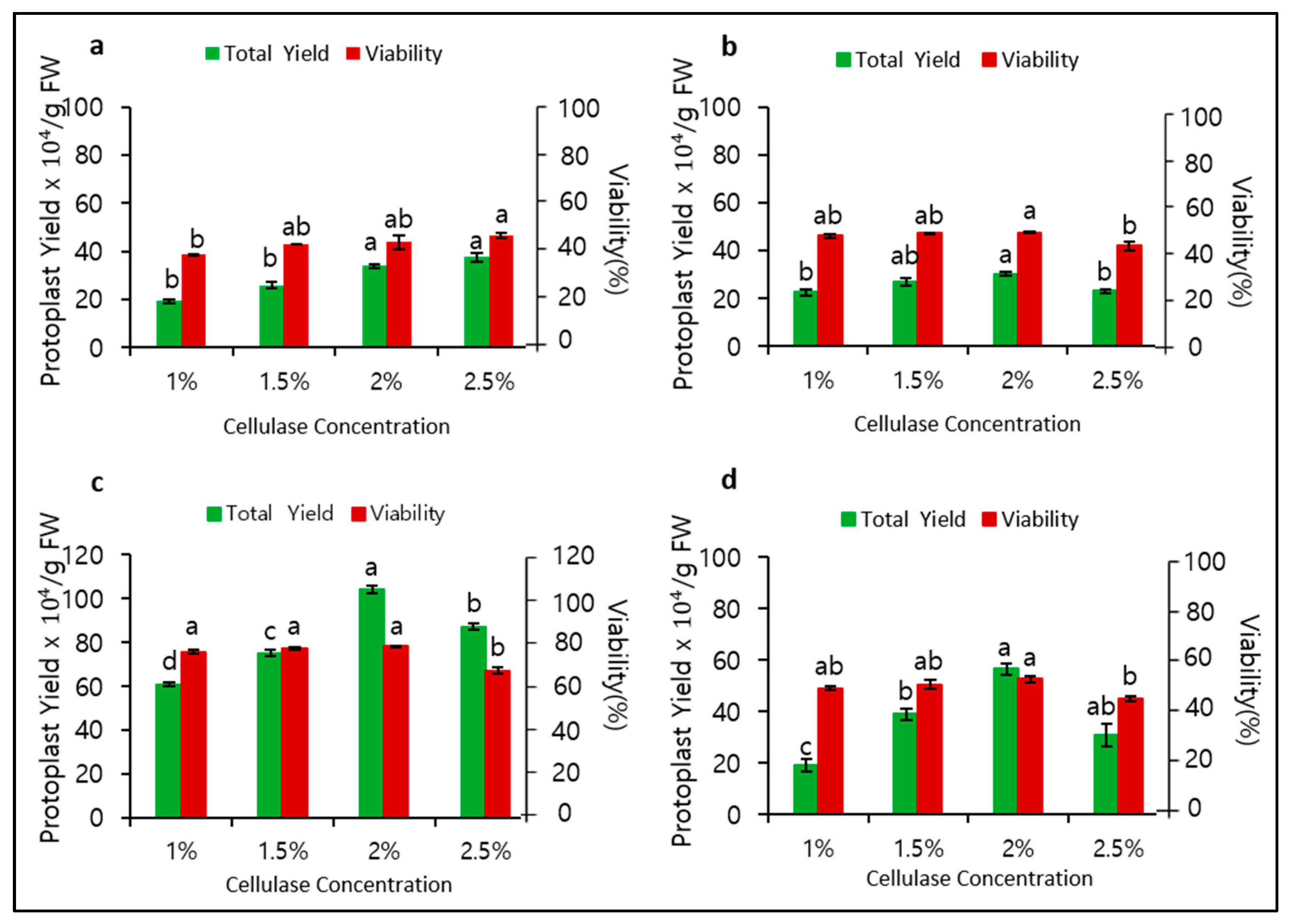
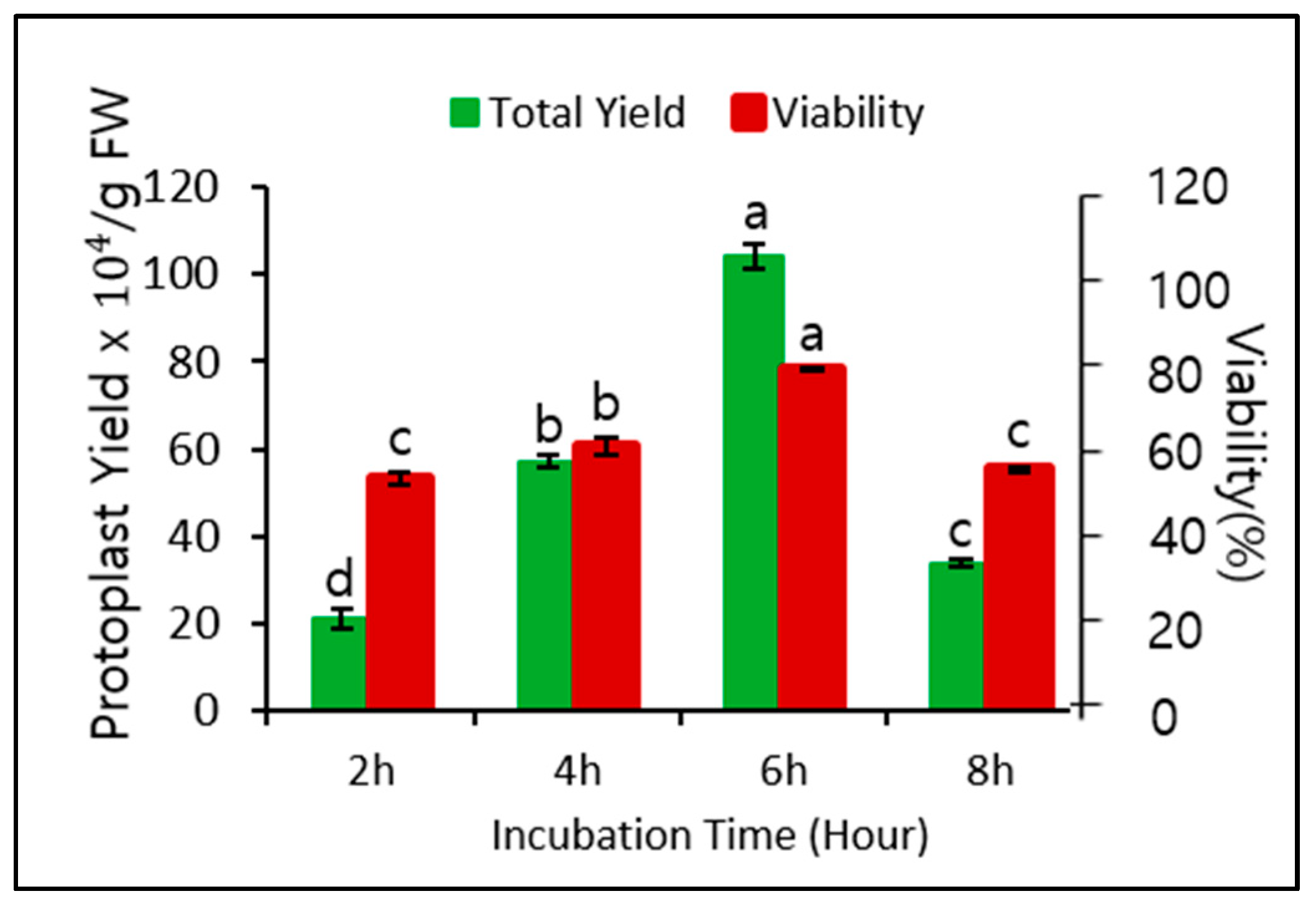
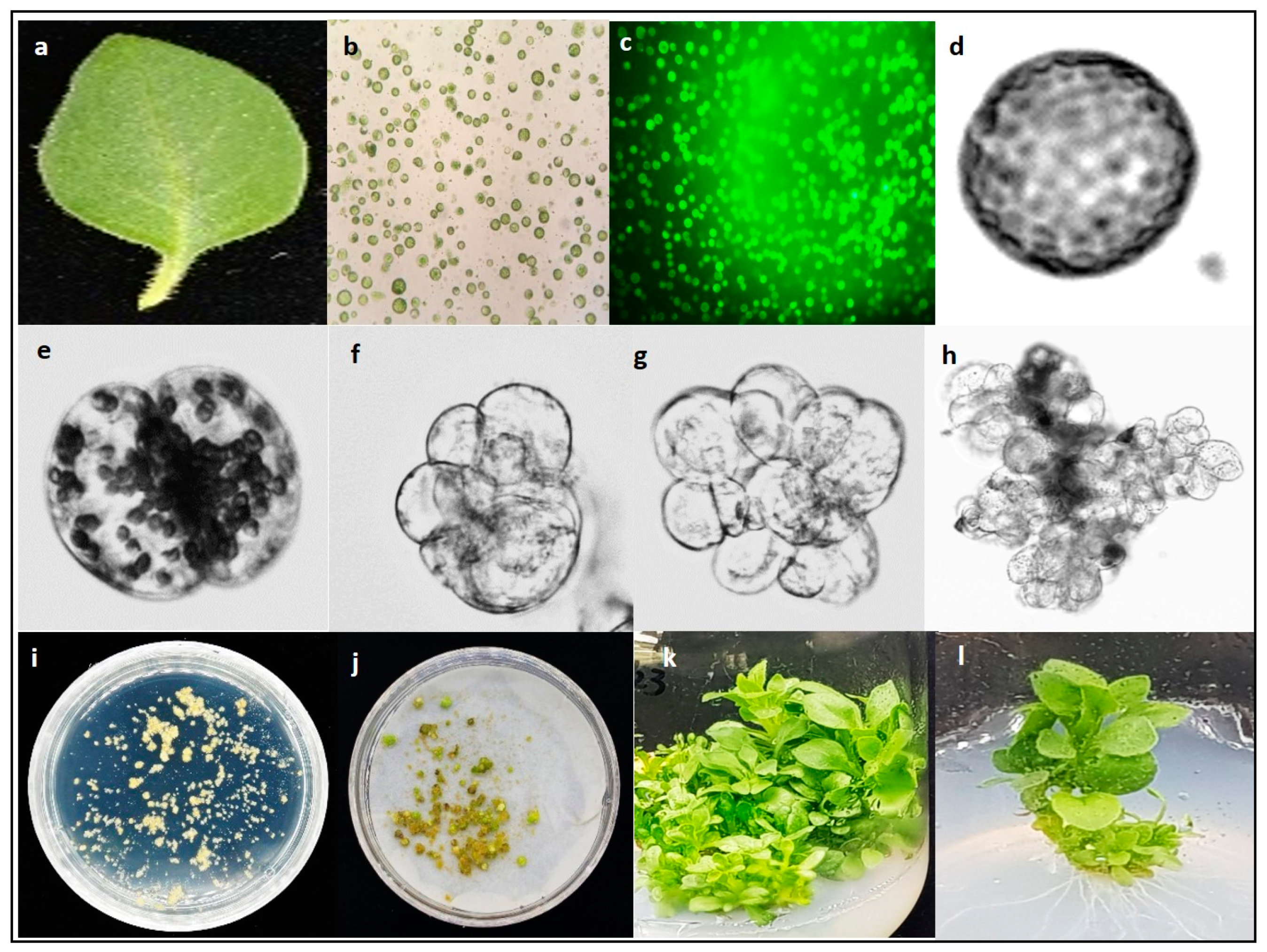
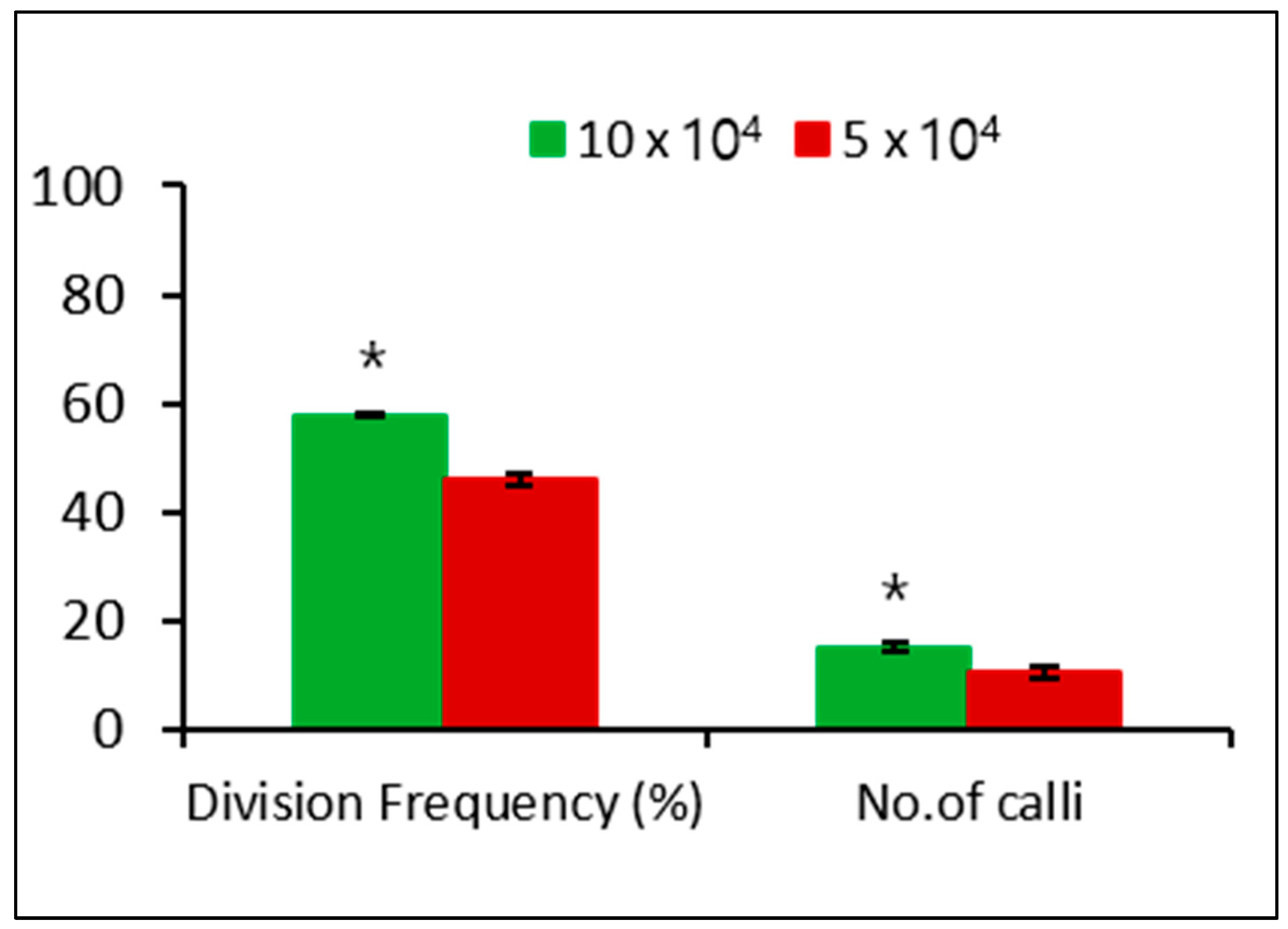
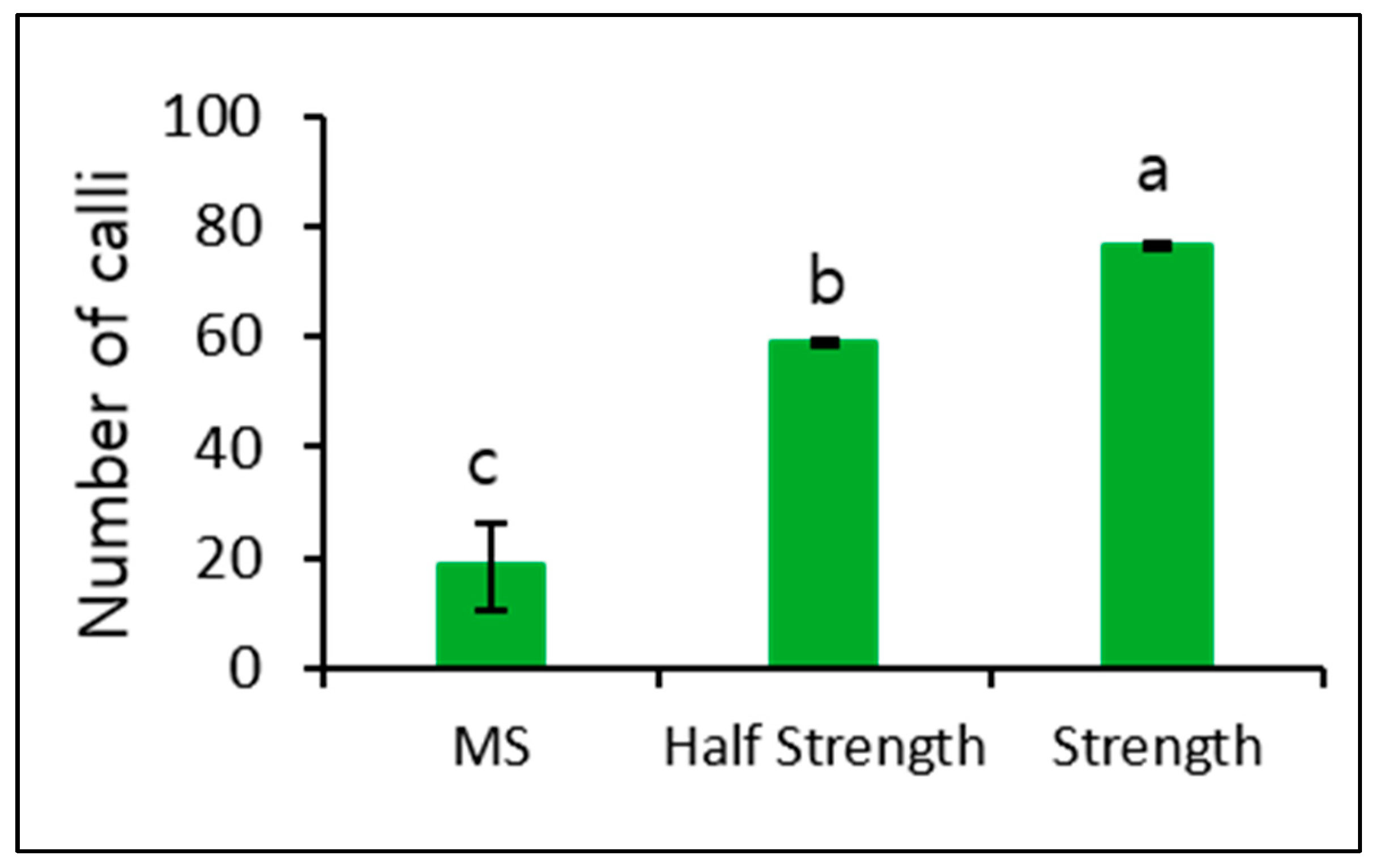
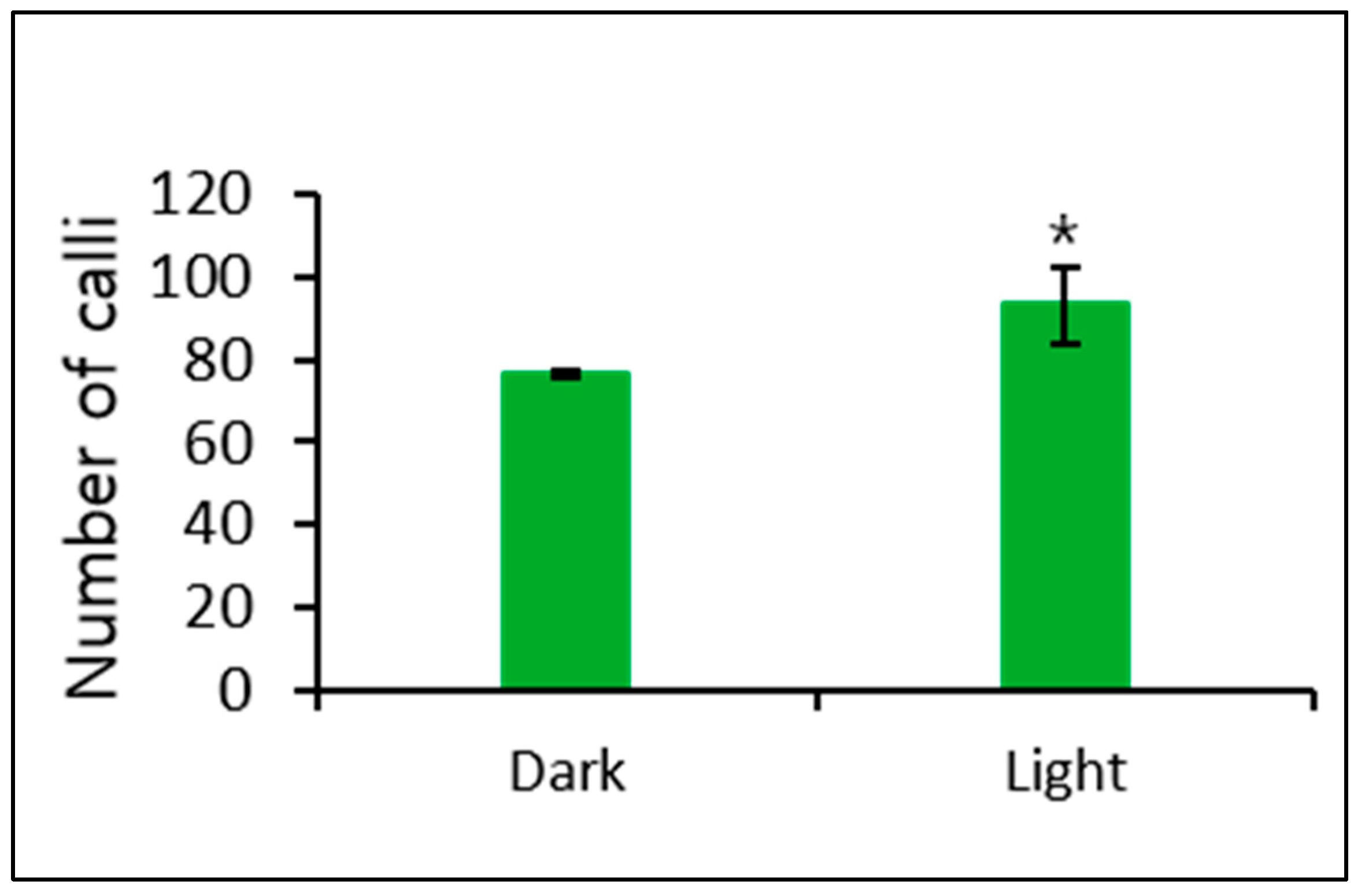
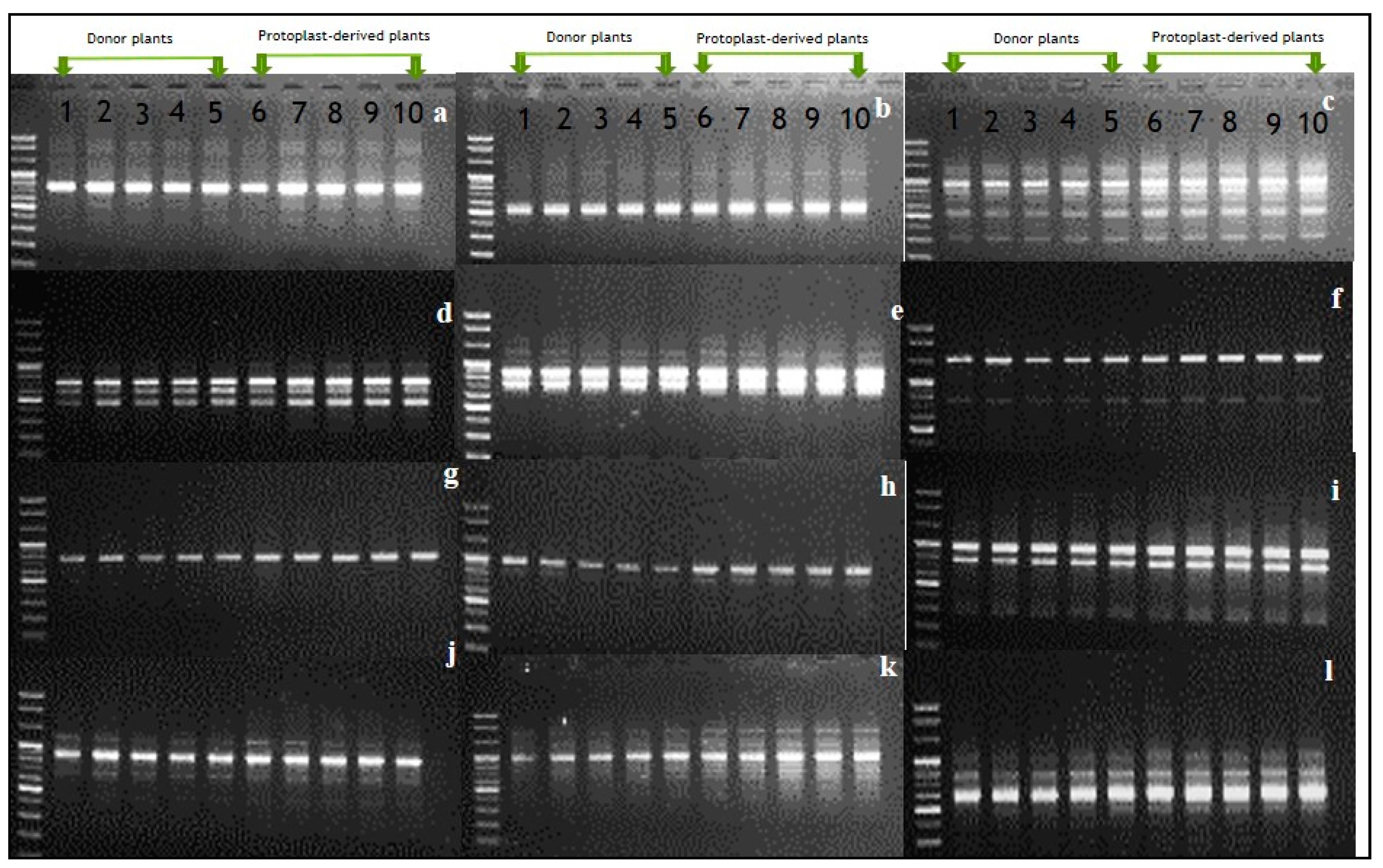
| Microcolony Viability | |||
|---|---|---|---|
| Plating Density (×104) | Mannitol (0.6 M) | Mannitol (0.58 M) | Mannitol (0.56 M) |
| Day 28 | Day 28 | Day 28 | |
| 15 | 20.1 ± 1.7 f | 53.2 ± 0.2 b | 35.7 ± 1.4 c |
| 10 | 41.1 ± 0.6 cde | 61.5 ± 1.0 a | 36.5 ± 1.6 de |
| 5 | 46.2 ± 2.6 c | 57.7 ± 2.7 ab | 42.2 ± 1.2 cd |
| PGR (mg L−1) | Regeneration (%) | No. of Shoots/Explant | |
|---|---|---|---|
| 6-BA | IBA | ||
| 0 | 0 | 0 d | 0 e |
| 0.5 | 0.5 | 0 d | 0 e |
| 1 | 0.1 | 40 b | 1.8 c |
| 1 | 0.2 | 53.3 a | 9.0 a |
| 1 | 0.5 | 20 c | 1.0 d |
| 1.5 | 0.5 | 40 b | 3.5 b |
| 2.0 | 0.5 | 44.4 b | 4.0 b |
© 2020 by the authors. Licensee MDPI, Basel, Switzerland. This article is an open access article distributed under the terms and conditions of the Creative Commons Attribution (CC BY) license (http://creativecommons.org/licenses/by/4.0/).
Share and Cite
Kang, H.H.; Naing, A.H.; Kim, C.K. Protoplast Isolation and Shoot Regeneration from Protoplast-Derived Callus of Petunia hybrida Cv. Mirage Rose. Biology 2020, 9, 228. https://doi.org/10.3390/biology9080228
Kang HH, Naing AH, Kim CK. Protoplast Isolation and Shoot Regeneration from Protoplast-Derived Callus of Petunia hybrida Cv. Mirage Rose. Biology. 2020; 9(8):228. https://doi.org/10.3390/biology9080228
Chicago/Turabian StyleKang, Hyun Hee, Aung Htay Naing, and Chang Kil Kim. 2020. "Protoplast Isolation and Shoot Regeneration from Protoplast-Derived Callus of Petunia hybrida Cv. Mirage Rose" Biology 9, no. 8: 228. https://doi.org/10.3390/biology9080228
APA StyleKang, H. H., Naing, A. H., & Kim, C. K. (2020). Protoplast Isolation and Shoot Regeneration from Protoplast-Derived Callus of Petunia hybrida Cv. Mirage Rose. Biology, 9(8), 228. https://doi.org/10.3390/biology9080228





